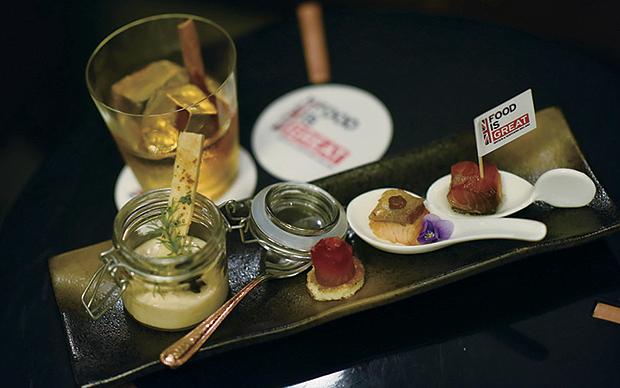
L'Auberge de la Feniere, in a stone farmhouse set in vineyards near the southeastern town of Lourmarin, has had no trouble holding on to its old customers, while attracting new ones with its coeliac-friendly if quirky haute cuisine.
Alternative choice: Deli offers lean cuisines for healthier eating
"I've replaced gastronomy with gluten by gastronomy without gluten and everyone has signed on... going from one to the other without realising it," said Reine Sammut, a self-taught chef who earned her Michelin star back in 1995.
Her daughter Nadia, 35, developed an intolerance to gluten and lactose at a very young age, a condition that stunted her growth.
Hospitalised at age 29, she spent the next two years bedridden until finally she was diagnosed with coeliac disease, which is now known to affect about one in 100 people in Europe and the United States.
"Thirty-five years ago, doctors didn't know about coeliac disease," Nadia says. "The doctors told me that I had destroyed my immune system, I was at the height of the illness."
Nadia, a trained chemist who is passionate about food, easily persuaded her mother to drop traditional ingredients in favour of gluten-free alternatives "so that everyone could eat at the same table".
"The basic ingredients needed are not easy to find, but Nadia tracked them down. I only had to test them," Reine says.
The restaurant, part of a 12-bedroom hotel run by the Sammuts along with a cooking school, offers a special 55 euro ($60) menu, half the usual price, to encourage guests to sample the best of gluten-free cuisine.
While the Auberge de la Feniere is France's only gluten-free restaurant to boast a Michelin star, many top restaurants such as Le Castellaras in the southern resort city of Cannes are prepared for gluten-free requests.
"For Valentine's Day, one couple never imagined we could offer a gluten-free menu," said Le Castellaras's Hermance Joplet, who served up a nutty risotto of locally grown spelt with sauteed baby vegetables for them.
Among the house specialities that proved particularly challenging for the Auberge de la Feniere to recreate without resorting to gluten ingredients was its truffles in puff pastry.
Nadia achieved the "impossible" by using a blend of chestnut and quinoa flour to produce the pastry.
Squash flour and almond extract substitute for wheat flour in their signature dessert dubbed the Paris-Lourmarin, a re-imagined Paris-Brest, the traditional ring-shaped choux pastry filled with a praline-flavoured cream.
Guaranteeing the absence of gluten entails heavy emphasis on traceability, and mother and daughter select their ingredients with utmost care, as well as growing them in their organic garden.
The restaurant's pork meat comes from a farmer in the nearby Luberon mountains who feeds his pigs on chickpeas; the fish comes from Martigues, near Marseille and "if there's no fishing, there's no fish" on the menu, Nadia says.
Their rice comes from a farmer in the Camargue who uses weed-loving ducks instead of herbicides.
4 breakfast foods to avoid
And the bread, also gluten-free of course, is made in clay pots, reviving a baking method used by the ancient Egyptians. "Back then the flour was low in gluten," Nadia says.
She and her mother admit that gluten-free cooking is something of a fad in France, but stress "active awareness".
"We should know what we are eating," says Nadia, who trains top chefs around the world in gluten-free cuisine.
She also teaches apprentice chefs about allergies, food safety and traceability through her Institut Cuisine Libre (Free Cuisine Institute).







1732105641-0/BeFunky-collage-(78)1732105641-0-270x192.webp)


1732518687-0/Copy-of-Untitled-(78)1732518687-0-270x192.webp)






COMMENTS (1)
Comments are moderated and generally will be posted if they are on-topic and not abusive.
For more information, please see our Comments FAQ